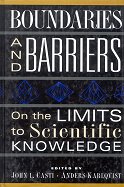The 1997 annual Abisko seminar brought together scientists and
science fiction writers to discuss
the use and importance of narrative in science. This collects together
some of the participants' papers. Most are interesting, but maybe not
quite long enough to develop their ideas in full. I suspect the conference
itself was quite fun.
All the participants agree that story-telling is important in how we
understand science, at whatever level. The fiction writers also reckon
that SF is important for insulating us from surprises when new technology
appears in our lives, for allowing us to have already had the ethical
debates in fiction. However, Paul McAuley points out that the media and
the public tend to go for the emotional horror slant, rather than the more
rational SFnal perspective -- so maybe SF insulates only SF fans?
Contents
- • John D. Barrow. The Analogy of Nature. 1999
- Scientists use analogies to describe nature; this may be limiting what theories they can come up with. There may be no analogies for deep theories.
- • Greg Bear. Proving the Dream. 1999
- How science fiction and science work together to change the future
- • Gregory Benford. Beyond this Horizon: envisioning the next century, or stories of our (preventable?) future(s). 1999
- The 20th century saw incredible advances due to physics; the 21st will see even more, due to biology.
- • John L. Casti. The Cambridge Quintet: the chronicle of an
experiment in 'scientific fiction'. 1999
- The reasons for using 'scientific fiction' to explain science
- • Jack Cohen. Becoming Maureen -- a story of development. 1999
- The importance, and difficulty, of understanding process. [I
felt I was coming in at the second part of some larger story.]
- • Per-A. Johansson. Algorithmic and Asthetic Storytelling: alternative approaches to imagination and reality. 1999
- Our current scientific, or "algorithmic" style of story
telling doesn't cover everything -- we still need stories of how to live
our lives. [Unfortunately, from my point of view, Johansson has a god in
these stories. I do feel we need these higher level stories, but I
prefer ones we explicitly construct for ourselves, rather than
ones attempting to discern some non-existent Platonic ideal.]
- • Kjell Jonsson. Einstein at the Amusement Park: the public story of relativity in Swedish culture. 1999
- Einstein's theories of relativity were not well-received in Sweden, neither by the Nobel Committee, nor by the scientific community
- • Anders Karlqvist. Telling Science. 1999
- There are at least four different levels for communicating science, depending on the audience -- and all four are valuable
- • Paul J. McAuley. Frankenstein's Daughters. 1999
- SF looks at scientific advances neutrally -- story outcomes may be good or bad. Horror starts with the emotional "yuk" factor, and it's always bad. And now science is advancing so fast that we are running out of SF stories to prepare us for the future.
- • Larry Niven. Mission to Abisko. 1999
- A personal journal of his last-minute attendance at the conference
- • Ian Stewart. Secret Narratives of Mathematics. 1999
- A plea that mathematicians pay attention to the narrative structure of their proofs, telling a compelling, understandable "story", rather than just concentrating on the "syntax"

